Tech
A Look at Crypto Casinos

Key Crypto Gambling Market Statistics & Trends To Know
- The global iGaming market went from $37 billion prior to the pandemic to over $70 billion in 2024, and is expected to reach over $150 billion in 2030.
- Sports betting makes up 43% of online gambling market revenue, followed by casino games at 32%.
- Fiat bets still account for most of the revenue, and recent estimates place the crypto gambling market size at $250 million.
- Interest in Bitcoin casinos quadrupled between 2019 and 2021. In 2022, around 4% of all online gambling searches were crypto-related.
- Crypto made up nearly 8.5% of gross gaming revenue (GGR) for sports betting in 2021.
- The crypto bet sum grew over 20% between 2022 and 2023, while the crypto bet count went up by over 50%.
- In 2023, BTC accounted for 73.3% of all crypto gambling transactions, followed by Ethereum at just 9.9%. DOGE was also within the top five, accounting for 3.1% of iGaming bets.
- Recreational gamblers make up the majority of crypto gamers. Most Ethereum gamblers only gamble 1-10 times, and less than 20% place over 100 bets.
- The average crypto gambler is likely to be male, young, tech-savvy, and interested in speculative investments like day trading.
- Online gamblers increasingly prioritize privacy, data safety, and fast transactions.
- In the US, 62% of current iGamers aged 18-34 were interested in crypto gambling. In this age group, 62% of potential crypto bettors were men.
What Is Crypto Gambling And How Does It Work?
Crypto gambling is a form of digital gambling that allows players to pay in cash using cryptocurrencies like Bitcoin or Ethereum.
Crypto gambling takes place on online platforms, often dubbed ‘crypto casinos’, where players generally have access to the same games known in traditional casinos (like blackjack, poker, or slot machines).
To place a bet or withdraw winnings, players must make digital transfers between their crypto wallet and the casino’s. Due to the very nature of crypto transactions, crypto casinos must employ blockchain technology.

Source: Crypto News
Thanks to its secure, decentralized recording and sharing of transaction data, blockchain technology sets crypto gambling apart from traditional iGaming, conferring multiple benefits like:
- Efficient transactions: Crypto allows for larger transactions than traditional online payments, and the transfers typically take only minutes to hours to process.
- Increased privacy: Although crypto transactions can be traced across digital wallets, the holders’ identities remain anonymous.
- Enhanced security: Thanks to the privacy of crypto transactions, players’ personal information is safe even in case of data breaches.
- Lower fees: Crypto casinos have lower operational costs, and crypto network fees are typically lower than other online payment methods. Thus, crypto gamblers can enjoy higher Return To Player rates.
- Reduced risk of fraud: Unlike bank transactions, crypto transactions can’t be disputed or reversed, and players can monitor all transactions on public ledgers, which ensures transparency.
These perks improve iGaming experience, help gambling platforms attract more customers and give crypto casinos a competitive edge.
Crypto Gambling Market – General Statistics
While crypto gambling has grown rapidly in recent years, it still represents a small fraction of the broader online gambling market, and more in-depth reports about crypto gambling segmentation are still necessary.
Based on recent data, the crypto gambling segment could mirror trends within the wider online gambling market.
Developments In The Online Gambling Market
Online gambling has seen an astronomical rise throughout the pandemic, when regular players started increasingly using online platforms during the COVID lockdowns.
The global iGaming market nearly doubled since 2018, prior to the pandemic, going from $37 billion to over $70 billion in recent years. Since then, online gambling has maintained its peak, and this positive trend is expected to continue.
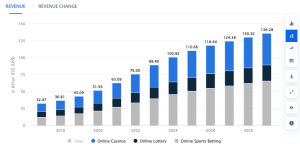

Source: Statista
Per 2022 figures provided by Statista and Business Wire, the global online gambling market was recently valued at roughly $64 to $81 billion (averaging a little over $70 billion across estimates).
A 2023 study published by Grand View Research came to similar numbers, placing the online gambling market value at $70.64 billion. According to these estimates, the gambling market is expected to reach over $150 billion in 2030 at a CAGR of 11.7%.
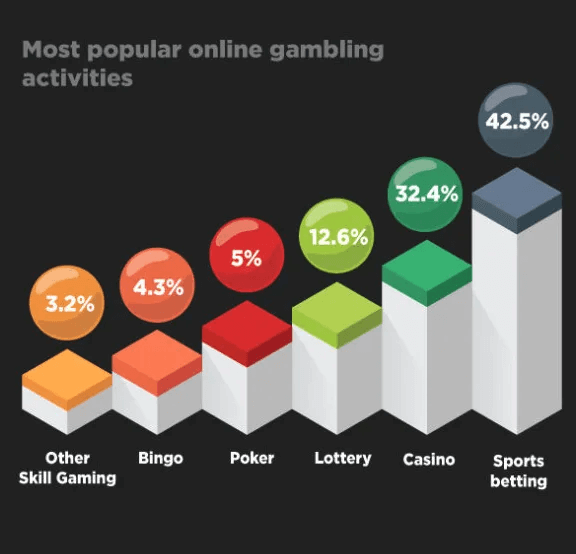

Source: Yahoo Finance
Sports betting has historically been the leading iGaming activity, and is expected to maintain its #1 spot for the foreseeable future. However, as of 2022, casino games accounted for nearly a third of all global online gambling revenue, coming in second place.
We can expect sports betting to be the leading segment for crypto gambling as well, and online betting platforms are already on their way to capitalize off this emerging trend.
According to a 2021 Statista survey, 43% of eSports executives believe crypto integration is a significant growth opportunity for online sports betting.
Additionally, 48% believe in developing a global consumer base, which crypto could help facilitate due to its decentralized nature and widespread availability, even in unbanked populations.
Crypto Segment Within The Global iGaming Market
Some of the rising popularity of online gambling has carried over to crypto casinos.
Although the first crypto casino, SatoshiDice, first launched in 2012, crypto gambling has seen the largest uptick since 2021.
According to an article in The Daily Guardian, around 4% of all online gambling searches were crypto-related in 2022. While this might not sound like a lot, the same source found that interest for Bitcoin casinos quadrupled over less than 2 years.
Crypto has been gaining traction as a leading currency for online gambling, although fiat money is still the leading method of exchange in iGaming.
While we don’t have exact numbers, the most recent crypto gambling market statistics place the crypto gambling market size at $250 million. Although still a small share of the online gambling market, crypto iGaming adoption is at an all-time high.
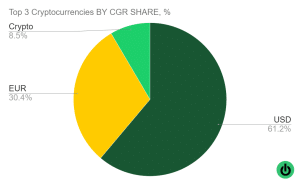

Data source: SOFTSWISS. Like this infographic? Feel free to use it on your website or blog, but please remember to give us credit by linking back to https://techreport.com/statistics/crypto-gambling-market-statistics/
A 2021 report by the iGaming developer SOFTSWISS suggests crypto is gaining traction in sports betting. This is unsurprising, since sports betting is the leading iGaming segment worldwide.
According to their findings, crypto made up nearly 8.5% of gross gaming revenue (GGR) for sports betting in 2021 across multiple global iGaming brands implementing the SOFTSWISS Sportsbook platform.
Overall, crypto was the third most used currency in sports betting after the US dollar and euro. Football bets made up 59% of the GGR share, followed by tennis (23%), and basketball (11%).
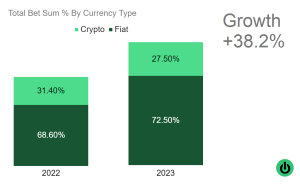

Data source: SOFTSWISS. Like this infographic? Feel free to use it on your website or blog, but please remember to give us credit by linking back to https://techreport.com/statistics/crypto-gambling-market-statistics/
A subsequent SOFTSWISS report, which looked at data from over 600 crypto-friendly iGaming brands, found that the total crypto bet sum registered a growth of over 20% between 2022 and 2023.
Within the same period, the total crypto bet count went up by over 50%. It seems iGamers are placing increasingly more crypto bets, driving up the total bet sum.
However, it’s also worth noting the average crypto bet sum has decreased from its early 2022 peak (over 3 euros per person), and stabilized at an average of 1.7 euro over the past two years. As of late 2023, the average crypto bet was twice the value of a fiat bet.
Most Popular Cryptocurrencies For Crypto Gambling
The same SOFTSWISS report also found Bitcoin was the most used cryptocurrency in iGaming. In 2023, BTC accounted for 73.3% of all crypto gambling transactions, followed by Ethereum at just 9.9%.
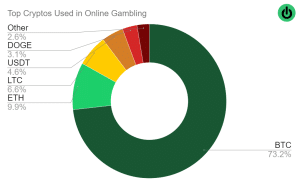

Data source: SOFTSWISS. Like this infographic? Feel free to use it on your website or blog, but please remember to give us credit by linking back to https://techreport.com/statistics/crypto-gambling-market-statistics/
The prevalence of BTC and ETH within crypto gambling also mirrors their market dominance, with BTC accounting for over half of the global crypto market, and ETH making up over 17%, more than all other popular cryptocurrencies combined.
DOGE, one of the best memecoins, was also within the top five, accounting for 3.1% of iGaming bets and beating other popular cryptos like BNB or Solana.
Overall, Bitcoin appears the most popular cryptocurrency used in online gambling. According to some sources, the reverse might also be true – crypto gambling could be one of the most popular uses for Bitcoin, based on historical transaction data.
As a previous Bitcoin News article shows, betting accounted for over 50% of all BTC transactions in 2013. However, this could be the case for various reasons, including the low adoption of BTC in other establishments at the time and the large number of crypto casinos coming out since SatoshiDice’s debut in 2012.
It’s unclear if gambling is still the most common type of BTC transaction. According to a 2023 article by iGB, 60% of all BTC transactions are related to iGaming, and 55% of the global online gambling population owns cryptocurrency.
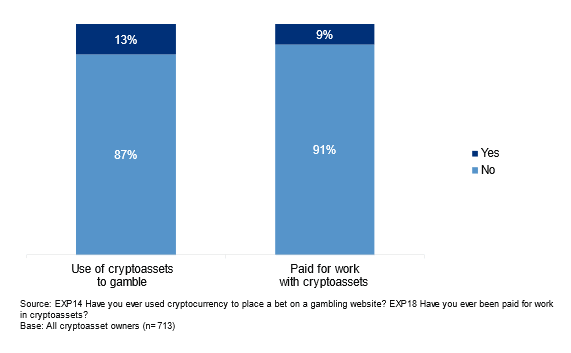
 Source: Gov.UK
Source: Gov.UK
However, a 2022 UK paper looking at 713 crypto asset owners found that only 13% of people used their crypto for gambling, although the UK is second globally for online gambling revenue.
In fact, over 50% of survey participants said they purchased crypto as an investment, and 55% never sold any of their crypto assets. Another 18% said they held crypto assets to buy goods and services.
A 2020 paper in Royal Society looking at gambling transactions on the Ethereum blockchain alone, found that the majority of iGamers partake in recreational gambling.
In 2017, approximately 60-65% of the ETH gamblers only gambled 1-10 times. Less than 20% placed over 100 bets. Across approximately 250,000 individual bets observed throughout April to December, the average bet size was 1.528 ETH, although this figure also includes the large bets from high rollers.
A similar 2020 study looking at over 2 million transactions across three iGaming platforms on the ETH blockchain found that the average crypto gambler spends roughly $110 on 6 bets in a day. The heavily involved crypto gamblers spent over $120,000 over 35 days.
Crypto Gambling Market Statistics By Region
One of the advantages of crypto iGaming is its widespread global accessibility, thanks to blockchain casinos letting players bet from around the globe. Unfortunately, the anonymity of crypto also makes it difficult to track crypto gambling market statistics by region.
While we don’t currently have in-depth regional data about crypto gambling itself, looking at online gambling and crypto adoption rates gives us a general idea about potential trends.
Regions By Online Gambling Revenue
As of 2015, Europe has been leading the online gambling market, generating nearly the same revenue as all other regions combined. In 2022, Europe still accounted for over 41% of the global market share, according to the latest figures provided by Grand View Research.
However, the APAC is expected to register the fastest growth until 2030, as a result of increased internet adoption, economic growth, changes to online gambling legislation, and a high crypto penetration rate in the region.
Regional Differences Across iGaming Segments
Globally, sports betting accounts for most of the online gambling revenue, with Australia, the US, and the UK leading the sector, according to Statista’s revenue estimates. At a regional scale, Europe had the highest sports betting revenue, followed by APAC.
Europe had the most countries generating over $1,000 million in revenue in 2022, with the UK generating an estimated $3,837 million. Germany was second with $1,658 million, followed by France ($1,449 million) and Italy ($1,006 million).
In the APAC, Australia and India had the largest sports betting revenues in 2022, approximately $7,737 million and $1,389 million, respectively. Australia was also the biggest adopter in the region with a penetration rate of 23%, followed by South Korea at 8%.
In North America, the US had over 8 times the revenue of Canada in 2022, although Canada had the largest online sports betting penetration rate of 34%.
Casino games are the second most lucrative online gambling segment, generating nearly a third of global revenue. As of 2022, Europe dominates the global online casino segment, with the UK registering the highest online casino revenue of roughly $5,695 million.
Germany and Italy were also among the world’s top 5, with online casino revenues of $1,574 million and $1,388 million, respectively. North America was second for global online casino revenue, with the US generating $4,680 million. Canada was second in North America and third globally with a revenue of $1,972 million.
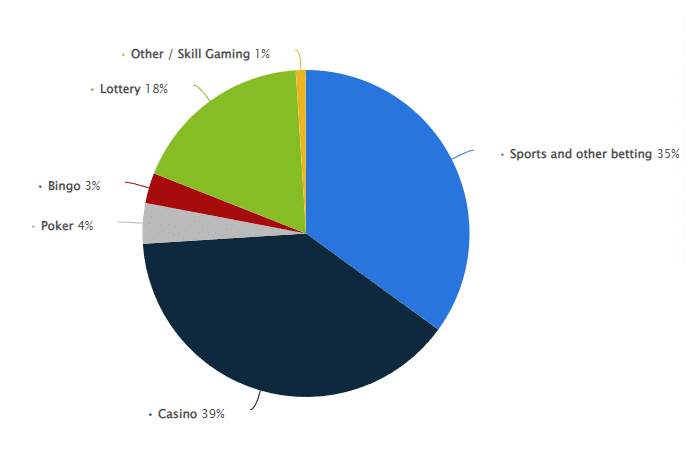
 Source: Statista
Source: Statista
Overall, Europe is the biggest player on the online gambling market, in both sports betting and casinos. According to a December 2022 Statista report, sports and other betting accounted for 35% of online gambling revenue in Europe, while casinos made up 39%.
North America was second globally for casino revenue, while the APAC took second place for online sports betting. These regional differences might suggest a stronger online casino presence in Western countries, and a more active user base across all segments in Europe.
Crypto Adoption Rates By Region
According to a 2023 Statista survey of respondents from 56 countries, crypto adoption is particularly high in the APAC. In 2022 and 2023, 20% or more of respondents from Malaysia, India, Singapore, Vietnam, South Korea, and Indonesia said they owned or used crypto.
The crypto adoption rate was lower in Western countries at under 20%. Just 16% of US respondents owned crypto in 2023, followed by 15% or less of respondents in the majority of European countries.
The UK, Germany, Italy, and France, the European countries with the biggest online gambling revenues, had a crypto adoption rate of 11-12%.
While Europe currently leads the online gambling market, the widespread crypto adoption in the APAC region could become a driving factor for the expected market expansion in the region. In India, in particular, online sports betting and crypto adoption are both at an all-time high.
Crypto Gambling Demographics – Who’s The Average Crypto iGamer?
The average crypto gamer is likely to be male, young, and interested in speculative investments like day trading.
A Statista report of 15,960 global consumers found that 12.7% of men used cryptocurrency for gambling and betting in 2022, compared to 11.1% of women.
The total number of male crypto gamblers is likely a lot higher than that of female gamblers, considering men disproportionately outweigh women in crypto ownership.
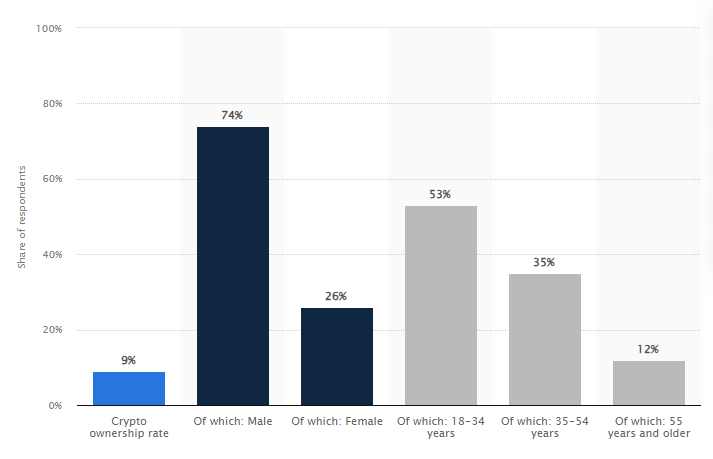
 Source: Statista
Source: Statista
For example, a 2023 YouGov survey of US consumers with online gambling accounts showed 62% of respondents aged 18-34 were interested in crypto gambling, compared to less than a third of those aged 35-54.
Within this high-interest age group, men accounted for 62% for potential crypto bettors. Interestingly, potential crypto gamblers were also more likely to be interested in sports betting, particularly soccer (75% of potential crypto gamblers vs 50% of all online gamblers).
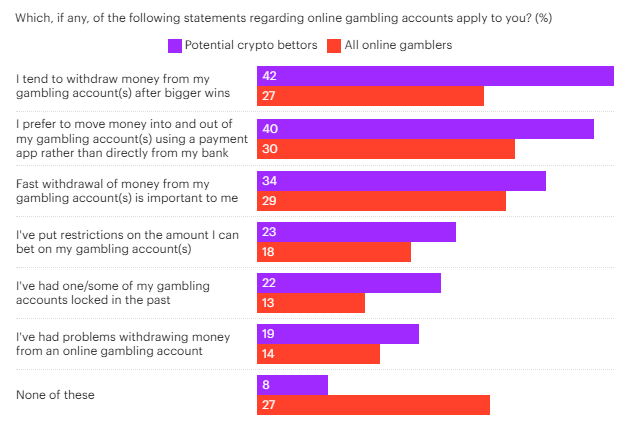
 Source: YouGov
Source: YouGov
Potential crypto gamblers in the survey showed a higher preference for shorter withdrawal times and using payment apps over bank transfers. These two factors likely inform their higher interest in blockchain gambling.
Previous 2022 UK figures from the HMRC mirror these age and gender trends. Men in the survey were over twice as likely to own crypto assets compared to women, and those aged 18-24 were the most likely to own crypto out of all age brackets.
Among crypto bettors in the UK survey, 23% were self-employed or working as a business director. Around 40% of crypto bettors also worked with a financial advisor, and 17% had other active investments.
It appears crypto gamblers are also more likely to trade cryptocurrency regularly, and there’s also considerable overlap between crypto traders and high-risk stock traders. However, crypto traders and crypto gamblers are younger than stocks-only traders.
Those who partake in crypto trading and gambling are also more likely to be well-educated, technologically-savvy, and have a deeper understanding of cryptocurrency than other groups.
Main Factors Influencing Crypto Gambling Trends
Since the inception of SatoshiDice in 2012, the global crypto gambling market is estimated to have reached $250 million, and crypto might now be the third most popular betting currency after the dollar and euro.
Although crypto iGaming is still an emerging market, there are already hundreds of crypto casinos and people are showing increasing interest in crypto bets. We can expect this trend to continue thanks to a few contributing factors.
Technological Advances
A combination of blockchain technology, cross-platform integrations, and widespread internet adoption have made crypto gambling possible and accessible on a global scale.
Payment apps like Neteller or Skrill already let players deposit crypto for payments in legacy casinos like Bet365 and Unibet. But nowadays, more iGaming developers are implementing novel payment methods like Bitcoin to further facilitate crypto gambling.
By directly providing in-app crypto payments, online casinos can reach a wider audience of players otherwise unserviced by common banks or payment apps. In-app crypto payments also ensure faster transactions and lower fees, contributing to a better user experience.
And blockchain technology doesn’t just make payments easier. It also changes gambling as we know it, providing transparency, security, and ensuring provably fair gaming to increase players’ trust.
Thanks to this, players can verify the fairness of each game and monitor every betting transaction on a decentralized, immutable ledger. These perks will likely continue to incentivize online casinos and bettors to switch to crypto.
Continued Adoption Of Cryptocurrency
iGaming is increasingly popular, though crypto only accounts for a small market share. The ongoing adoption of cryptocurrency will change that, as a growing number of potential bettors will be holding crypto in the future.
Currently, fewer than 20% of people in Western countries own or trade cryptocurrencies, although Europe and North America are the biggest players on the global online gambling market.
For example, according to 2022 data from the European Gaming & Betting Association, gross online gaming revenue in Europe went up by 12.5 billion euro over the pandemic.
The UK registered a 65% revenue share from online gambling activity, but maintains a crypto adoption rate of 10-12%.
However, interest in cryptocurrencies is increasing globally, and countries like India or South Korea already stand out for above-average adoption rates. According to Statista data, most European countries also saw a smaller but consistent increase since 2019.
| % Crypto holders | ||
| Country | 2019 | 2023 |
| 🇮🇹 Italy | 6% | 11% |
| 🇸🇪 Sweden | 4% | 11% |
| 🇩🇪 Germany | 4% | 12% |
| 🇨🇦 Canada | 4% | 13% |
| 🇪🇸 Spain | 10% | 15% |
| 🇺🇸 The United States | 5% | 16% |
| 🇦🇺 Australia | 7% | 17% |
| 🇳🇱 The Netherlands | 10% | 19% |
| 🇰🇷 South Korea | 6% | 20% |
| 🇮🇳 India | 8% | 27% |
Based on these trends, we can expect the number of crypto owners (and potential bettors) to keep going up in key regions where online gambling is already booming.
Changing Consumer Behavior
Multiple reports we’ve shared in this article show online gamblers prefer privacy, safety, and convenience. With blockchain casinos better equipped to meet these demands, we might see more iGamers adopting crypto in the future.
According to a series of infographics from Cryptobetting.net, 23% of crypto gamblers believe blockchain technology makes gambling more secure, while 12% said they chose crypto because the blockchain protects their IP.
These findings suggest a sizable share of crypto bettors prefer keeping their banking and other personal information private while gambling, which minimizes the risk of data loss.
The same infographics show 17% of respondents thought using crypto cuts costs, likely thanks to reduced transaction fees. Another 15% said digital currency works well for handling microtransactions.
The 2023 YouGov survey covered previously had similar findings – 34% of potential crypto bettors claiming fast withdrawals are a priority. Additionally, 40% of potential crypto bettors preferred not to use their bank account when placing bets and withdrawing money.
Additionally, the share of iGamers using phones surpassed that of desktop gamers for the first time in 2019. According to SOFTSWISS, 77% of sports bets in 2020 were placed via mobile. Since 2020, the downloads for mobile crypto wallet apps have also doubled.
These changes could lead to an influx of crypto casino apps. However, casino websites will likely be more popular among high crypto rollers, as desktop bettors accounted for 75% of the total bet sum.
Regulatory Shifts
Crypto casinos are still controversial and under-regulated. The legality of crypto gambling also depends on local laws pertaining to gambling overall. In Australia, for example, interactive gambling is illegal, and the country went on to ban crypto gambling altogether.
In other jurisdictions, crypto gaming remains a gray area. Within the US, the Unlawful Internet Gambling Enforcement Act (UIGEA) prohibits online gambling without mentioning crypto gaming. Even in the states where iGaming is legal, crypto casinos remain unregulated.
In Europe, crypto gambling is legal in multiple countries, though regulatory standards differ and could be difficult to implement.
For example, a 2022 paper looking at popular crypto casinos in the UK found only 47.5% held a valid operating license, and none of the operators verified the identity of new players.
Given the lack of KYC identification in many crypto casinos, money laundering and underground banking remain a concern, especially in underregulated regions.
Even the best-known crypto casinos like Stake, Jackbit, 7Bit, or Wild.io operate out of Curaçao, an international iGaming licensing jurisdiction with a controversial reputation due to its lax anti-money laundering and KYC policies.
However, the ongoing development of crypto iGaming could lead to updated regulations and improved compliance, thereby helping crypto casinos establish legitimacy and trust among clients.
In early 2024, Curaçao’s minister of finance, Javier Silvania, announced a plan to improve the jurisdiction’s anti-money laundering policies, which would imply stricter KYC standards.
Stricter iGaming policies and regulatory success could set a precedent, encouraging wider acceptance of crypto casinos and fueling crypto’s expansion into the global gambling market.
What’s Next For The Crypto Gambling Market?
With the global iGaming market set to surpass $150 billion by 2030, the potential for crypto gambling is clear.
As online gambling and crypto adoption rates increase, crypto casinos will likely attract an increasing audience of prospective gamers and providers. Mirroring wider iGaming trends, we expect crypto sports betting to be the leading gambling segment in the future.
More online bettors already seek the privacy and convenience of blockchain technology, and sports betting operators are willing to meet these new demands by integrating blockchain technology within their services.
However, crypto gambling still faces challenges like regulatory ambiguity and security concerns. Long-term success will hinge on how well the industry addresses these challenges and adapts to evolving regulations.
References
Click to expand and view sources
- Cryptocurrency Technical Brief (ResearchGate)
- What is blockchain? (McKinsey)
- COVID-19 and resultant restrictions on gambling behaviour (NCBI)
- Online Gambling – Worldwide (Statista)
- Market size of the online gambling industry worldwide in 2022, with a forecast for 2032 (Statista)
- Global Online Gambling Market Report 2023: Blockchain, IoT and VR Technologies are Changing the Online Gambling Landscape (Business Wire)
- Online Gambling Market Size, Share & Trends Analysis Report By Type, By Device, By Region, And Segment Forecasts, 2023–2030 (Grand View Research)
- Crypto Gambling Skyrockets – What Do The Infographics Show (Yahoo Finance)
- Most significant opportunities for growth in the eSports betting market according to industry professionals worldwide as of October 2021 (Statista)
- Banking the unbanked: why emerging markets dominate crypto adoption (Financial Times)
- The History Of Crypto Gambling: When And How It Started (Medium)
- Crypto Online Gambling Boom Continues (The Daily Guardian)
- 55% of all Bitcoin transactions are related to gambling (CoinMarketCap)
- Latest Online Betting Trends: Insights from SOFTSWISS (SOFTSWISS)
- Time to Invest in Crypto? SOFTSWISS 2023 iGaming Market Overview (SOFTSWISS)
- Bitcoin (BTC), Ethereum (ETH) dominance – their market cap relative to the market cap of all other cryptocurrencies in the world (Statista)
- Bitcoin Gamblers Have Wagered $4.5 Billion in BTC Since 2014 (News.Bitcoin)
- Betting on crypto payments for igaming with CoinPayments (iGB)
- Individuals holding cryptoassets: uptake and understanding (Gov.UK)
- Online Gambling Market – Global Comparison (Statista)
- Understanding gambling behaviour and risk attitudes using cryptocurrency-based casino blockchain data (NCBI)
- Inside the decentralised casino: A longitudinal study of actual cryptocurrency gambling transactions (NCBI)
- Size of the online gambling market worldwide from 2012 to 2018, by region (Statista)
- Online Gambling Market – Online Sports Betting Global Comparison (Statista)
- Online Gambling Market – Online Casinos Global Comparison (Statista)
- Distribution of gross online gambling revenues in Europe as of December 2022, by betting activity (Statista)
- Share of respondents who indicated they either owned or used cryptocurrencies in 56 countries and territories worldwide from 2019 to 2023 (Statista)
- Most popular goods and services bought by consumers worldwide when using cryptocurrencies for online shopping in 2022, by gender and income group (Statista)
- Crypto ownership among consumers in the United States in the three months prior to November 2022, by age and gender (Statista)
- Assessing interest in cryptocurrency gambling in the US (YouGov)
- The interrelations of cryptocurrency and gambling: Results from a representative survey (ScienceDirect)
- Understanding ‘Provably Fair’ in iGaming (SOFTSWISS)
- European Online Gambling Key Figures 2022 Edition (EGBA)
- How The Online Gambling Industry Grew Over Years (Crypto Betting)
- Estimate of the number of downloads of the 21 largest apps that allow for cryptocurrency storage worldwide from January 2015 to December 2023 (Statista)
- The Interactive Gambling Act 2001 (DITRDCA)
- FCA welcomes credit and crypto gambling ban. Calls for inquiry on lotteries loophole (Financial Counseling Australia)
- Unlawful Internet Gambling Enforcement Act (FTC.Gov)
- States With Legal Betting: Which States Allow Online Gambling? (Betting USA)
- Online & Crypto Gambling Regulations in Europe (Casinos Blockchain)
- Safer Gambling and Consumer Protection Failings Among 40 Frequently Visited Cryptocurrency-Based Online Gambling Operators (ResearchGate)
- Casinos and cryptocurrency: major drivers of money laundering, underground banking, and cyberfraud in East and Southeast Asia (UNODC)
- LOK will “enhance” Curaçao’s reputation, asserts minister of finance (iGB)

 Our Editorial Process
Our Editorial Process
The Tech Report editorial policy is centered on providing helpful, accurate content that offers real value to our readers. We only work with experienced writers who have specific knowledge in the topics they cover, including latest developments in technology, online privacy, cryptocurrencies, software, and more. Our editorial policy ensures that each topic is researched and curated by our in-house editors. We maintain rigorous journalistic standards, and every article is 100% written by real authors.
Tech
Harvard Alumni, Tech Moguls, and Best-Selling Authors Drive Nearly $600 Million in Pre-Order Sales

BlockDAG Network’s history is one of innovation, perseverance, and a vision to push the boundaries of blockchain technology. With Harvard alumni, tech moguls, and best-selling authors at the helm, BlockDAG is rewriting the rules of the cryptocurrency game.
CEO Antony Turner, inspired by the successes and shortcomings of Bitcoin and Ethereum, says, “BlockDAG leverages existing technology to push the boundaries of speed, security, and decentralization.” This powerhouse team has led a staggering 1,600% price increase in 20 pre-sale rounds, raising over $63.9 million. The secret? Unparalleled expertise and a bold vision for the future of blockchain.
Let’s dive into BlockDAG’s success story and find out what the future holds for this cryptocurrency.
The Origin: Why BlockDAG Was Created
In a recent interview, BlockDAG CEO Antony Turner perfectly summed up why the market needs BlockDAG’s ongoing revolution. He said:
“The creation of BlockDAG was inspired by Bitcoin and Ethereum, their successes and their shortcomings.
If you look at almost any new technology, it is very rare that the first movers remain at the forefront forever. Later incumbents have a huge advantage in entering a market where the need has been established and the technology is no longer cutting edge.
BlockDAG has done just that: our innovation is incorporating existing technology to provide a better solution, allowing us to push the boundaries of speed, security, and decentralization.”
The Present: How Far Has BlockDAG Come?
BlockDAG’s presale is setting new benchmarks in the cryptocurrency investment landscape. With a stunning 1600% price increase over 20 presale lots, it has already raised over $63.9 million in capital, having sold over 12.43 billion BDAG coins.
This impressive performance underscores the overwhelming confidence of investors in BlockDAG’s vision and leadership. The presale attracted over 20,000 individual investors, with the BlockDAG community growing exponentially by the hour.

These monumental milestones have been achieved thanks to the unparalleled skills, experience and expertise of BlockDAG’s management team:
Antony Turner – Chief Executive Officer
Antony Turner, CEO of BlockDAG, has over 20 years of experience in the Fintech, EdTech, Travel and Crypto industries. He has held senior roles at SPIRIT Blockchain Capital and co-founded Axona-Analytics and SwissOne. Antony excels in financial modeling, business management and scaling growth companies, with expertise in trading, software, IoT, blockchain and cryptocurrency.
Director of Communications
Youssef Khaoulaj, CSO of BlockDAG, is a Smart Contract Auditor, Metaverse Expert, and Red Team Hacker. He ensures system security and disaster preparedness, and advises senior management on security issues.

advisory Committee
Steven Clarke-Martin, a technologist and consultant, excels in enterprise technology, startups, and blockchain, with a focus on DAOs and smart contracts. Maurice Herlihy, a Harvard and MIT graduate, is an award-winning computer scientist at Brown University, with experience in distributed computing and consulting roles, most notably at Algorand.
The Future: Becoming the Cryptocurrency with the Highest Market Cap in the World
Given its impressive track record and a team of geniuses working tirelessly behind the scenes, BlockDAG is quickly approaching the $600 million pre-sale milestone. This crypto powerhouse will soon enter the top 30 cryptocurrencies by market cap.
Currently trading at $0.017 per coin, BlockDAG is expected to hit $1 million in the coming months, with the potential to hit $30 per coin by 2030. Early investors have already enjoyed a 1600% ROI by batch 21, fueling a huge amount of excitement around BlockDAG’s presale. The platform is seeing significant whale buying, and demand is so high that batch 21 is almost sold out. The upcoming batch is expected to drive prices even higher.

Invest in BlockDAG Pre-Sale Now:
Pre-sale: https://purchase.blockdag.network
Website: https://blockdag.network
Telegram: https://t.me/blockDAGnetwork
Discord: Italian: https://discord.gg/Q7BxghMVyu
No spam, no lies, just insights. You can unsubscribe at any time.
Tech
How Karak’s Latest Tech Integration Could Make Data Breaches Obsolete

- Space and Time uses zero-knowledge proofs to ensure secure and tamper-proof data processing for smart contracts and enterprises.
- The integration facilitates faster development and deployment of Distributed Secure Services (DSS) on the Karak platform.
Karak, a platform known for its strong security capabilities, is enhancing its Distributed Secure Services (DSS) by integrating Space and Time as a zero-knowledge (ZK) coprocessor. This move is intended to strengthen trustless operations across its network, especially in slashing and rewards mechanisms.
Space and Time is a verifiable processing layer that uses zero-knowledge proofs to ensure that computations on decentralized data warehouses are secure and untampered with. This system enables smart contracts, large language models (LLMs), and enterprises to process data without integrity concerns.
The integration with Karak will enable the platform to use Proof of SQL, a new ZK-proof approach developed by Space and Time, to confirm that SQL query results are accurate and have not been tampered with.
One of the key features of this integration is the enhancement of DSS on Karak. DSS are decentralized services that use re-staked assets to secure the various operations they provide, from simple utilities to complex marketplaces. The addition of Space and Time technology enables faster development and deployment of these services, especially by simplifying slashing logic, which is critical to maintaining security and trust in decentralized networks.
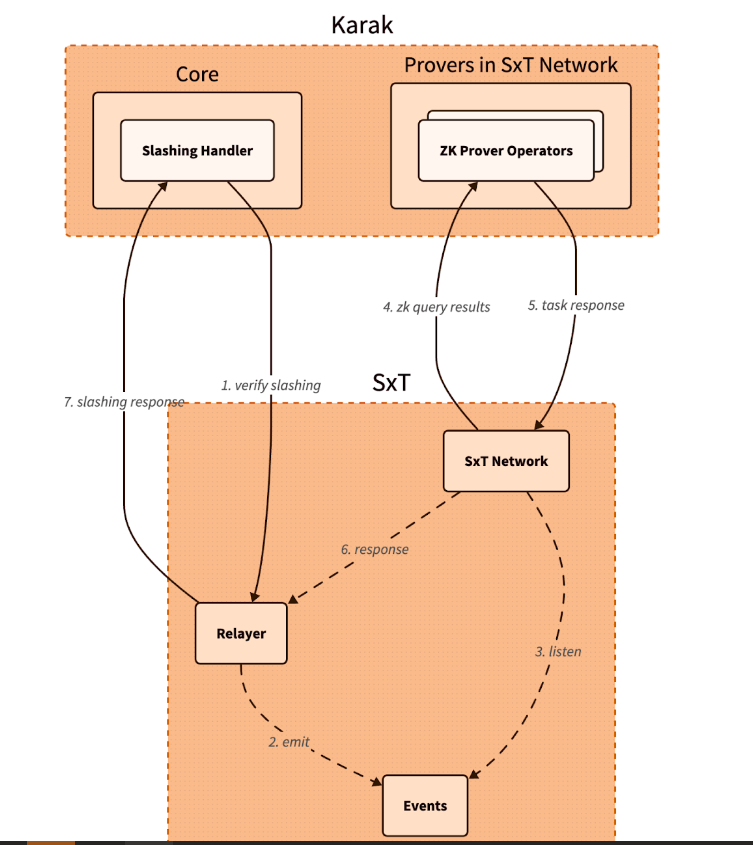
Additionally, Space and Time is developing its own DSS for blockchain data indexing. This service will allow community members to easily participate in the network by running indexing nodes. This is especially beneficial for applications that require high security and decentralization, such as decentralized data indexing.
The integration architecture follows a detailed and secure flow. When a Karak slashing contract needs to verify a SQL query, it calls the Space and Time relayer contract with the required SQL statement. This contract then emits an event with the query details, which is detected by operators in the Space and Time network.
These operators, responsible for indexing and monitoring DSS activities, validate the event and route the work to a verification operator who runs the query and generates the necessary ZK proof.
The result, along with a cryptographic commitment on the queried data, is sent to the relayer contract, which verifies and returns the data to the Karak cutter contract. This end-to-end process ensures that the data used in decision-making, such as determining penalties within the DSS, is accurate and reliable.
Karak’s mission is to provide universal security, but it also extends the capabilities of Space and Time to support multiple DSSs with their data indexing needs. As these technologies evolve, they are set to redefine the secure, decentralized computing landscape, making it more accessible and efficient for developers and enterprises alike. This integration represents a significant step towards a more secure and verifiable digital infrastructure in the blockchain space.
Website | X (Twitter) | Discord | Telegram
No spam, no lies, just insights. You can unsubscribe at any time.
Tech
Cryptocurrency Payments: Should CFOs Consider This Ferrari-Approved Trend?

Iconic Italian luxury carmaker Ferrari has announced the expansion of its cryptocurrency payment system to its European dealer network.
The move, which follows a successful launch in North America less than a year ago, raises a crucial question for CFOs across industries: Is it time to consider accepting cryptocurrency as a form of payment for your business?
Ferrari’s move isn’t an isolated one. It’s part of a broader trend of companies embracing digital assets. As of 2024, we’re seeing a growing number of companies, from tech giants to traditional retailers, accepting cryptocurrencies.
This change is determined by several factors:
- Growing mainstream adoption of cryptocurrencies
- Growing demand from tech-savvy and affluent consumers
- Potential for faster and cheaper international transactions
- Desire to project an innovative brand image
Ferrari’s approach is particularly noteworthy. They have partnered with BitPay, a leading cryptocurrency payment processor, to allow customers to purchase vehicles using Bitcoin, Ethereum, and USDC. This satisfies their tech-savvy and affluent customer base, many of whom have large digital asset holdings.
Navigating Opportunities and Challenges
Ferrari’s adoption of cryptocurrency payments illustrates several key opportunities for companies considering this move. First, it opens the door to new customer segments. By accepting cryptocurrency, Ferrari is targeting a younger, tech-savvy demographic—people who have embraced digital assets and see them as a legitimate form of value exchange. This strategy allows the company to connect with a new generation of affluent customers who may prefer to conduct high-value transactions in cryptocurrency.
Second, cryptocurrency adoption increases global reach. International payments, which can be complex and time-consuming with traditional methods, become significantly easier with cryptocurrency transactions. This can be especially beneficial for businesses that operate in multiple countries or deal with international customers, as it potentially reduces friction in cross-border transactions.
Third, accepting cryptocurrency positions a company as innovative and forward-thinking. In today’s fast-paced business environment, being seen as an early adopter of emerging technologies can significantly boost a brand’s image. Ferrari’s move sends a clear message that they are at the forefront of financial innovation, which can appeal to customers who value cutting-edge approaches.
Finally, there is the potential for cost savings. Traditional payment methods, especially for international transactions, often incur substantial fees. Cryptocurrency transactions, on the other hand, can offer lower transaction costs. For high-value purchases, such as luxury cars, these savings could be significant for both the business and the customer.
While the opportunities are enticing, accepting cryptocurrency payments also presents significant challenges that businesses must address. The most notable of these is volatility. Cryptocurrency values can fluctuate dramatically, sometimes within hours, posing potential risk to businesses that accept them as payment. Ferrari addressed this challenge by implementing a system that instantly converts cryptocurrency received into traditional fiat currencies, effectively mitigating the risk of value fluctuations.
Regulatory uncertainty is another major concern. The legal landscape surrounding cryptocurrencies is still evolving in many jurisdictions around the world. This lack of clear and consistent regulations can create compliance challenges for companies, especially those operating internationally. Companies must remain vigilant and adaptable as new laws and regulations emerge, which can be a resource-intensive process.
Implementation costs are also a significant obstacle. Integrating cryptocurrency payment systems often requires substantial investment in new technology infrastructure and extensive staff training. This can be especially challenging for small businesses or those with limited IT resources. The costs are not just financial; a significant investment of time is also required to ensure smooth implementation and operation.
Finally, security concerns loom large in the world of cryptocurrency transactions. While blockchain technology offers some security benefits, cryptocurrency transactions still require robust cybersecurity measures to protect against fraud, hacks, and other malicious activity. Businesses must invest in robust security protocols and stay up-to-date on the latest threats and protections, adding another layer of complexity and potential costs to accepting cryptocurrency payments.
Strategic Considerations for CFOs
If you’re thinking of following in Ferrari’s footsteps, here are the key factors to consider:
- Risk Assessment: Carefully evaluate potential risks to your business, including financial, regulatory, and reputational risks.
- Market Analysis: Evaluate whether your customer base is significantly interested in using cryptocurrencies for payments.
- Technology Infrastructure: Determine the costs and complexities of implementing a cryptographic payment system that integrates with existing financial processes.
- Regulatory Compliance: Ensure that cryptocurrency acceptance is in line with local regulations in all markets you operate in. Ferrari’s gradual rollout demonstrates the importance of this consideration.
- Financial Impact: Analyze how accepting cryptocurrency could impact your cash flow, accounting practices, and financial reporting.
- Partnership Evaluation: Consider partnering with established crypto payment processors to reduce risk and simplify implementation.
- Employee Training: Plan comprehensive training to ensure your team is equipped to handle cryptocurrency transactions and answer customer questions.
While Ferrari’s adoption of cryptocurrency payments is exciting, it’s important to consider this trend carefully.
A CFO’s decision to adopt cryptocurrency as a means of payment should be based on a thorough analysis of your company’s specific needs, risk tolerance, and strategic goals. Cryptocurrency payments may not be right for every business, but for some, they could provide a competitive advantage in an increasingly digital marketplace.
Remember that the landscape is rapidly evolving. Stay informed about regulatory changes, technological advancements, and changing consumer preferences. Whether you decide to accelerate your crypto engines now or wait in the pit, keeping this payment option on your radar is critical to navigating the future of business transactions.
Was this article helpful?
Yes No
Sign up to receive your daily business insights
Tech
Bitcoin Tumbles as Crypto Market Selloff Mirrors Tech Stocks’ Plunge
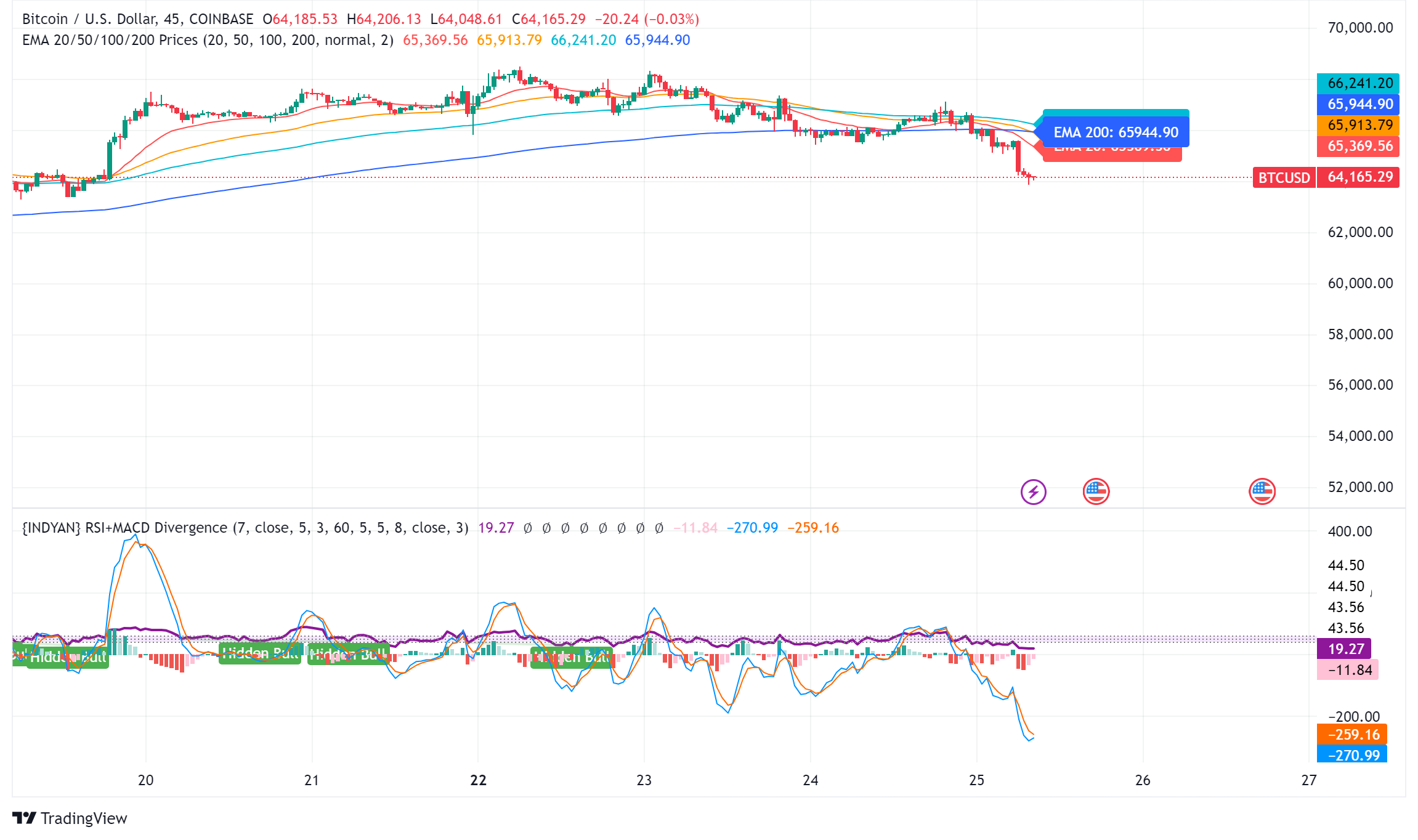
The world’s largest cryptocurrency, Bitcoin (BTC), suffered a significant price decline on Wednesday, falling below $65,000. The decline coincides with a broader market sell-off that has hit technology stocks hard.
Cryptocurrency Liquidations Hit Hard
CoinGlass data reveals a surge in long liquidations in the cryptocurrency market over the past 24 hours. These liquidations, totaling $220.7 million, represent forced selling of positions that had bet on price increases. Bitcoin itself accounted for $14.8 million in long liquidations.
Ethereum leads the decline
Ethereal (ETH), the second-largest cryptocurrency, has seen a steeper decline than Bitcoin, falling nearly 8% to trade around $3,177. This decline mirrors Bitcoin’s price action, suggesting a broader market correction.
Cryptocurrency market crash mirrors tech sector crash
The cryptocurrency market decline appears to be linked to the significant losses seen in the U.S. stock market on Wednesday. Stock market listing The index, heavily weighted toward technology stocks, posted its sharpest decline since October 2022, falling 3.65%.
Analysts cite multiple factors
Several factors may have contributed to the cryptocurrency market crash:
- Tech earnings are underwhelming: Earnings reports from tech giants like Alphabet are disappointing (Google(the parent company of), on Tuesday, triggered a sell-off in technology stocks with higher-than-expected capital expenditures that could have repercussions on the cryptocurrency market.
- Changing Political Landscape: The potential impact of the upcoming US elections and changes in Washington’s policy stance towards cryptocurrencies could influence investor sentiment.
- Ethereal ETF Hopes on the line: While bullish sentiment around a potential U.S. Ethereum ETF initially boosted the market, delays or rejections could dampen enthusiasm.
Analysts’ opinions differ
Despite the short-term losses, some analysts remain optimistic about Bitcoin’s long-term prospects. Singapore-based cryptocurrency trading firm QCP Capital believes Bitcoin could follow a similar trajectory to its post-ETF launch all-time high, with Ethereum potentially converging with its previous highs on sustained institutional interest.
Rich Dad Poor Dad Author’s Prediction
Robert Kiyosaki, author of the best-selling Rich Dad Poor Dad, predicts a potential surge in the price of Bitcoin if Donald Trump is re-elected as US president. He predicts a surge to $105,000 per coin by August 2025, fueled by a weaker dollar that is set to boost US exports.
BTC/USD Technical Outlook
Bitcoin price is currently trading below key support levels, including the $65,500 level and the 100 hourly moving average. A break below the $64,000 level could lead to further declines towards the $63,200 support zone. However, a recovery above the $65,500 level could trigger another increase in the coming sessions.
-

 Videos1 month ago
Videos1 month agoAbsolutely massive: the next higher Bitcoin leg will shatter all expectations – Tom Lee
-

 News12 months ago
News12 months agoVolta Finance Limited – Director/PDMR Shareholding
-

 News12 months ago
News12 months agoModiv Industrial to release Q2 2024 financial results on August 6
-

 News12 months ago
News12 months agoApple to report third-quarter earnings as Wall Street eyes China sales
-

 News12 months ago
News12 months agoNumber of Americans filing for unemployment benefits hits highest level in a year
-

 News1 year ago
News1 year agoInventiva reports 2024 First Quarter Financial Information¹ and provides a corporate update
-

 News1 year ago
News1 year agoLeeds hospitals trust says finances are “critical” amid £110m deficit
-

 Markets1 year ago
Markets1 year agoWhale Investments in Bitcoin Hit $100 Billion in 2024, Fueling Insane Investor Optimism ⋆ ZyCrypto
-

 DeFi1 year ago
DeFi1 year ago🏴☠️ Pump.Fun operated by Insider Exploit
-

 Videos1 year ago
Videos1 year ago$1,000,000 worth of BTC in 2025! Get ready for an UNPRECEDENTED PRICE EXPLOSION – Jack Mallers
-

 Videos1 year ago
Videos1 year agoABSOLUTELY HUGE: Bitcoin is poised for unabated exponential growth – Mark Yusko and Willy Woo
-

 Tech1 year ago
Tech1 year agoBlockDAG ⭐⭐⭐⭐⭐ Review: Is It the Next Big Thing in Cryptocurrency? 5 questions answered





